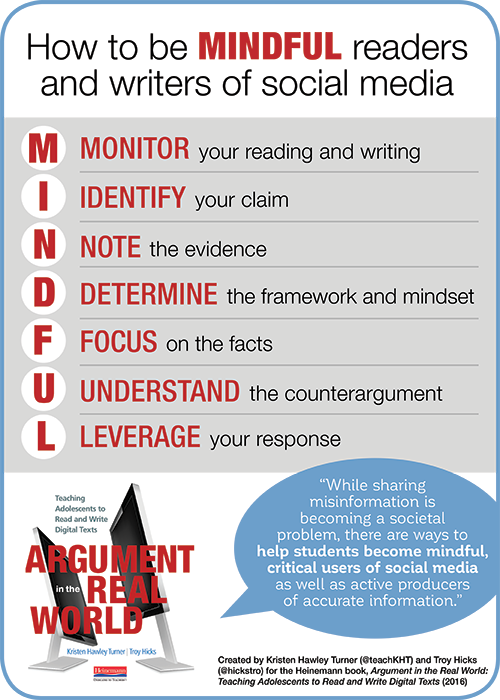
As a writer — both in the sense that I am a blogger and the author of texts for teachers — I am well aware of the fact that writing is never really “done,” it is just “due.” I am thankful that I have the opportunity to keep writing, keep sharing, keep updating. It is as important now as it has ever been.
When my colleague and co-author, Kristen Turner, and I were putting the finishing touches on our book, Argument in the Real World, last summer, we knew that the world would be experiencing digital arguments in many ways across the closing months of the US 2016 election cycle. However, we had no idea that “fake news” or “alternative facts” would become part of the Orwellian discourse. Over the past few months, the incredible team at Heinemann has been sharing a number of posts and videos related to the book:
- Building Digital Literacy Takes Argument Beyond the Classroom from the Heinemann blog – Nov 4, 2016
- Teaching Argument in the Digital World from the Heinemann blog – Nov 10, 2016
- How Teachers Can Disrupt Fake News from Heinemann via Medium – Dec 15, 2016
- The Heinemann Podcast: Argument in the Real World from the Heinemann blog (includes audio and transcript) – Jan 6, 2017
- Seriously? Seriously. The Importance of Teaching Reading and Writing in Social Media written by Kristen and Troy, from Heinemann via Medium – Jan 11, 2017
- The Power of Video in Digital Argument: Literacy Instruction in the Era of Fake News written by Kristen and Troy, from Heinemann via Medium – Jan 20, 2017
- Teaching the Craft of Argument to Support Meaningful Conversation from the Heinemann blog (includes video clip) – January 25, 2017
They also helped us refine the MINDFUL poster:

Finally, here is a video in which I demonstrate how students can remix existing news content to analyze the implicit arguments presented in the news.
As teachers continue to work with their students to overcome the many challenges we continue to face with media literacy, we will continue to update the book’s wiki page and share more ideas. My hope is that this collection of resources is a good place to begin those difficult lessons and conversations.

This work is licensed under a Creative Commons Attribution-NonCommercial-ShareAlike 4.0 International License.






